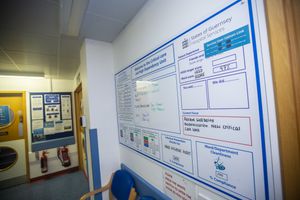HSC spent £11.8m. last year in agency staff to fill vacancies
MORE than £6m. was spent on hiring agency staff to cover acute hospital services last year, roughly four times the amount spent in 2021, figures released by Health and Social Care have shown.

In total, it spent £11.8m. on bringing in staff to fill vacancies in the health care sector. The department released the information following a series of written questions from Gavin St Pier about the hiring of agency staff.
HSC’s figures also showed that the cost of hiring agency staff in the adult services sector had risen from £3.31m. in 2021 to £5.11m. last year. Hospital services’ costs increased from £1.46m. to £6.10m.
And agency staff hired to fill gaps in children’s services cost £504,000, up from £221,000 in 2021. HSC’s total pay budget last year was £116.11m.
‘The increasing reliance on agency and locum staff has driven market forces and the cost of agency has increased significantly in the last 18 months,’ it said.
It said it was difficult to outline all of the reasons why agency spend had risen, but among the factors were the opening of additional beds at the PEH, extended hours being introduced in the Day Patient Unit, the opening of the De Havilland Ward, aimed solely at orthopaedic surgery patients, covering for staff absence due to Covid and other sickness, the management of year-round demand, and the fact that in 2020 and 2021 activity was suppressed due to the prevalence of Covid cases.
A total of 154 agency staff were being employed as of 3 January this year, HSC said, and this amounted to about 9% of its total workforce. These staff were helping fill some of the 444 vacancies across health care, including 157 in hospital services and 196 in adult community services.
The figures showed the difficulty of recruiting to posts in the latter service.
‘In some areas [this] would have previously been better supported by recruitment from the local community, but which is now proving to be more challenging, as recently advised by the committee,’ it said.
Guernsey’s situation was not unique and ‘it is also important to acknowledge the context within which health and social care is operating, which has changed significantly in recent years.’
It had been a challenge recruiting and retaining staff at national and international level, meaning that agency staff were sometimes required for longer periods to fill vacancies.
Higher tariffs for agency staff had resulted from the increasingly competitive nature of the recruitment environment, and it was proving harder to get staff to move away from family and friends.
‘Furthermore, the Bailiwick shortage of suitable and affordable self-contained accommodation for staff, including agency staff, does little to promote the island as a destination for prospective employees or help to “convert” agency appointments into permanent recruits, or indeed attract candidates seeking permanent posts through our recruitment campaigns.’
Deputy St Pier was invited to meet HSC if he wished to understand further the steps it had taken to limit agency spend and manage the effects of the system-wide pressures.





